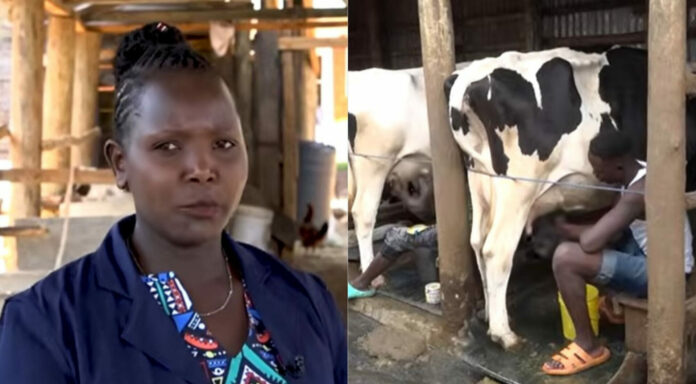Dairy farming is a major part of Kenya’s economy. Kenyans are known for their undying love for milk products such as tea, making dairy farming a profitable venture. Since the market isn’t fully exploited yet, there’s a big opportunity for new farmers to join in.
According to a 2017 study on livestock research for Rural Development, Kenya had about 4.3 million cattle. During that period, the country produced an estimated 3.43 billion litres of milk daily.
Dairy farming alone makes up approximately 14% of the national GDP generated from the agricultural sector.
An example of a dairy farmer is Caroline Koros from Kabianga, Kericho County. On her farm, she produces 200 litres of milk every day, which she sells to a milk cooperative for a fixed price of Sh. 45 per litre. This means she earns about Sh. 9,000 per day from milk sales.
To ensure she gets maximum profit, Caroline, like many other farmers have chosen to produce her own feeds to ensure that she saves on cost.
Caroline Koros shared that she began her farm 8 years ago with just one cow, primarily to provide milk for her family. Initially, this cow produced 6 liters of milk daily.
Since then, her herd has grown to have 27 dairy cows, producing a total of 200 litres of milk daily. Caroline has mostly raised the Friesian breed on her farm, as she believes there is a direct correlation between their feeding and milk production.
These are the best dairy cows for you to keep in Kenya
At the farm, milking occurs three times a day: in the morning, at noon, and in the evening. After milking, the cows are fed a meal consisting of hay, napier grass, and silage mixed with dairy meal and mineral salts.
“For the dairy meal, we give them 4kgs per feeding. As the herd has been growing, also milk yields have been improving since we have been gaining experience on how to do proper feeding,” Mrs. Koros elaborated.
Caroline attributes the high milk production to feeding the cows with dry matter rich in fibres, such as hay and silage. This encourages the cows to consume more water, resulting in higher milk volumes.
However, the main challenge she faces is the high cost of dairy meal and mineral salts.
Mrs Koros further explained that the market is no longer a challenger to the Kabianga dairy farmers as it was before. The dairy farmers in revived a dairy cooperative society where they give their milk.
The Kabianga Farmers Cooperative Society pays them Sh. 43.50 for the milk/litre and Sh. 2 for transport, which sums up to Sh. 45.50 per litre. Acording to her, this is a fair price as they can meet the cost of production and get some profits from it.
Here is a brief breakdown of Caroline’s approximate monthly expenditure:
- Dairy Meal – Sh. 71,000 (56%)
- Forage – Sh. 30,000 (23%)
- Labour – Sh. 14,000 (12%)
- Mineral Salts – Sh. 12,000 (9%)
Total = Sh. 127,000
If she earns approximately Sh. 9,000 per day from selling milk to the cooperative, her total income from milk sales could reach Sh. 270,000 over a month. Considering her expenses, this could result in profits of over Sh. 130,000.









